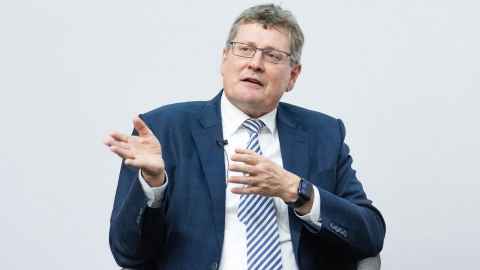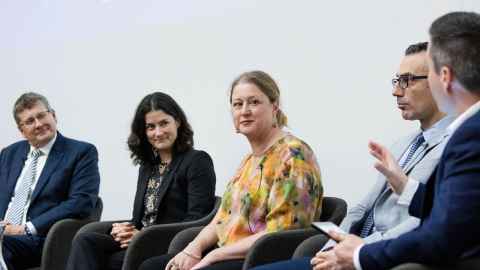Deloitte Top 200: Contact Energy wins Sustainability Leadership Award (NZ Herald)
Deloitte Top 200: Contact Energy wins Sustainability Leadership Award (NZ Herald)
Contact is dedicated to playing its role in creating a more sustainable future for New Zealand by leading the country’s decarbonisation efforts, and is making significant progress to achieving net-zero carbon by 2030.
This long-standing commitment to sustainability from the gentailer, coupled with the actions it has made, made it a stand-out winner for the Deloitte Top 200 Sustainability Leadership Award. The award recognises exemplary governance, leadership, accountability and long-term perspectives from companies as they evolve and adapt their business models to support and drive sustainable development.
The Deloitte Top 200 judges commended Contact for its significant efforts to decommission assets that generate electricity from fossil fuels, signifying a clear shift towards renewable energy sources and a clear intent to help decarbonise New Zealand, despite the absence of an overarching national energy strategy.
“We are impressed that Contact’s efforts in the space are driven and supported by leadership and filter across the national business. They have created a galvanising framework for decarbonisation that attracts diverse talent and genuine innovations for sustainability actions,” said Katie Beith, one of the judges in this award category.
Contact is actively investing in the future of sustainable energy with $1.2 billion in renewable generation currently under construction. This pipeline of projects includes geothermal, solar, wind and grid-scale batteries, which will see it not only reduce its carbon profile but also assist its customers in their decarbonisation efforts.
Contact chief executive Mike Fuge is enthusiastic about what this means for the future of New Zealand. “These investments are key to enabling Aotearoa New Zealand to meet its decarbonisation goals,” he says.
“We expect our generation portfolio to be more than 95 per cent renewable by FY27 and have set the ambitious goal to achieve net-zero emissions from our generation operations by 2035.”
Contact’s efforts have already boosted its renewable energy capacity to more than 80 per cent and led to a remarkable 33 per cent reduction in greenhouse gas emissions from generation since 2018.
Its world-class geothermal development near Taupō, Tauhara, will come on-stream in 2024.
It will be Contact’s sixth geothermal power station in the Taupō area.
Contact now has a pipeline of projects ahead of it in Taupō, including an expansion of its Te Huka geothermal plant and a replacement of the 1950s-era Wairākei geothermal power station.
“The wonderful thing about having a pipeline of projects around Tauhara is we can attract the workforce in for a project, and they get the opportunity to roll off on to the next project,” says Fuge.
The judges say a particularly commendable aspect of Contact’s sustainability efforts is its commitment to meaningful engagement with iwi and hapū, especially at the Tauhara plant, which shows a deep respect for indigenous involvement in sustainable energy projects.
In addition to its geothermal projects, Contact is pursuing other renewable energy projects, including a solar project at Christchurch Airport which will have around 300,000 solar panels on 300 hectares of land adjacent to the airport’s runways.
It is looking to develop a wind farm on the elevated land east of Wyndham in Southland.
This would be Contact’s first wind farm project and, with a plan for about 55 turbines generating as much as 300 megawatts of power, it would be New Zealand’s largest.
Contact’s decarbonisation journey has not only propelled the company toward a more sustainable future, but has also fostered engagement in sustainability across the organisation and helped to bring diverse talent on board.
“Staff engagement, as we have gone on this journey, has kept steadily rising and rising.
“This is a once-in-a-generation opportunity to be involved in the energy industry throughout this transition, and making sure you make yourself as attractive as possible is really critical.”
Finalist: Mercury
Mercury generates 100 per cent renewable electricity from hydro, geothermal and wind sources. The energy gentailer’s sites span the Waikato River, Central Plateau, Manawatū, South Taranaki, Otago and Southland, and it continues to invest in low-carbon electricity generation as part of its transition to a low-emissions, climate-resilient future.
Mercury’s dedication to sustainability over a long period of time earned it recognition as a finalist for the Top 200 Sustainability Leadership Award. Since 2015, it has steadily moved away from thermal generation, seeing a decrease in total emissions by 41 per cent.
Mercury general manager of sustainability Lucie Drummond says sustainability has been at the core of Mercury’s mission for a long time.
“One of the biggest drivers for us has been staying focused on taking an action-oriented approach to support New Zealand in the global transition that is occurring. We recognise our role, and we’re looking at ways we can be an authentic part of this.”
Mercury’s climate transition action plan sets out ambitious measures and targets aimed at achieving emissions reductions across the business.
Katie Beith says that in addition to having a clear plan, Mercury has recently reworked its purpose and long-term aspirations, which has resulted in sustainability now being strategically integrated into the business.
“This can be evidenced by the way sustainability has been embedded into the organisation’s culture, and it is clear Mercury’s processes allow ideas to come forward from staff,” says Beith.
“The team has made a significant effort to be open about their commitments and activities, as well as the real struggles they face in the transition, and Mercury strongly believes this is key to getting people engaged.”
Drummond emphasises that sustainability is a team effort, and no one person or organisation can achieve it alone. “We have tried to never have sustainability as a parallel universe that only a few people are involved in.”
“When we refreshed our long-term aspirations, we took a really holistic approach to the way we think about what success looks like in the future.”
Mercury collaborates with iwi in different ways, including having commercial partnerships with Māori land trusts for its geothermal developments.
It has also established and supported a range of programmes with iwi and other regional organisations, including educational initiatives, environmental and ecological restoration projects and a range of Māori cultural support initiatives.
Mercury is actively supporting its customers to reduce their emissions. Partnerships include a 10-year agreement with Ryman Healthcare to help underwrite construction of a solar power development in Northland and a 15-year agreement with Amazon Web Services to help achieve its target of net-zero carbon by 2040 by utilising half the capacity from Mercury’s Turitea South wind farm.
Finalist: KMD Brands
KMD Brands is a global outdoor, lifestyle and sports company consisting of three iconic brands: Kathmandu, Rip Curl and Oboz.
Founded under the Kathmandu brand in 1987, the company rebranded to KMD Brands in 2022 as part of its transformation to a global multi-channel business. This is KMD Brands’ fourth consecutive year as a finalist in the Sustainability Leadership category. It won this category in both 2021 and 2022.
In an era where the fashion industry faces increased scrutiny regarding material traceability, waste and offshore work practices, the judges recognise KMD Brands’ work as it continues to carve a path as a global leader with a genuine and mature response to sustainability.
Kathmandu first became a certified B Corporation in 2019 and was re-certified again this year. Additionally, both Rip Curl and Oboz achieved B Corp certification for the first time in 2023, making all individual brands — as well as KMD Brands itself — certified B Corps.
The certification requires independent verification of globally recognised high standards of social and environmental performance, public transparency and accountability. KMD Brands is one of the first multi-national companies in Australia and New Zealand to achieve individual certification for all its brands and is one of only 45 publicly traded companies globally that are certified.
KMD Brands chief legal and ESG officer Frances Blundell says the group and each of its brands are complex businesses, so the organisation is very proud that it could come together to achieve this collective goal. “It was the culmination of multiple years of planning and initiatives; requiring input and effort from a wide range of internal stakeholders across our business,” she says.
Katie Beith says KMD Brands’ efforts in B Corp show that alongside its innovation in its clothing and technical gear, it is committed to making its sustainability strategy part of everyone’s day-to-day activities, including at the store level, the supplier level and the customer level.
“KMD Brands is creating products that are durable and long-lasting. Circularity principles, climate and communities are the three key pillars of its sustainability focus,” she says.
As part of its commitment to circularity, KMD Brands has been introducing new programmes for repurposing and repairing old or damaged products. With its Rip Curl “take back” wetsuit recycling scheme, introduced in 2018, wetsuits from every brand are repurposed into soft-fall matting. It has been expanded across five countries and diverted more than 24,000kg of neoprene from landfill.
Rip Curl’s own wetsuit factory in Thailand offset 100 per cent of its operational emissions in 2021 and 2022, and diverted around 130 tonnes of offcuts from landfill, repurposing them into carpet underlay.
KMD Brands extends its sustainability focus beyond its own operations, engaging with its suppliers to help them meet ambitious sustainability goals by identifying problematic areas and working with them to find resolutions.
It recently held its first ESG conference with suppliers in Bangladesh, aimed at helping the business better understand how it can work in partnership to enhance social and environmental impact.
The Sustainability Leadership Award is sponsored by Deloitte.











